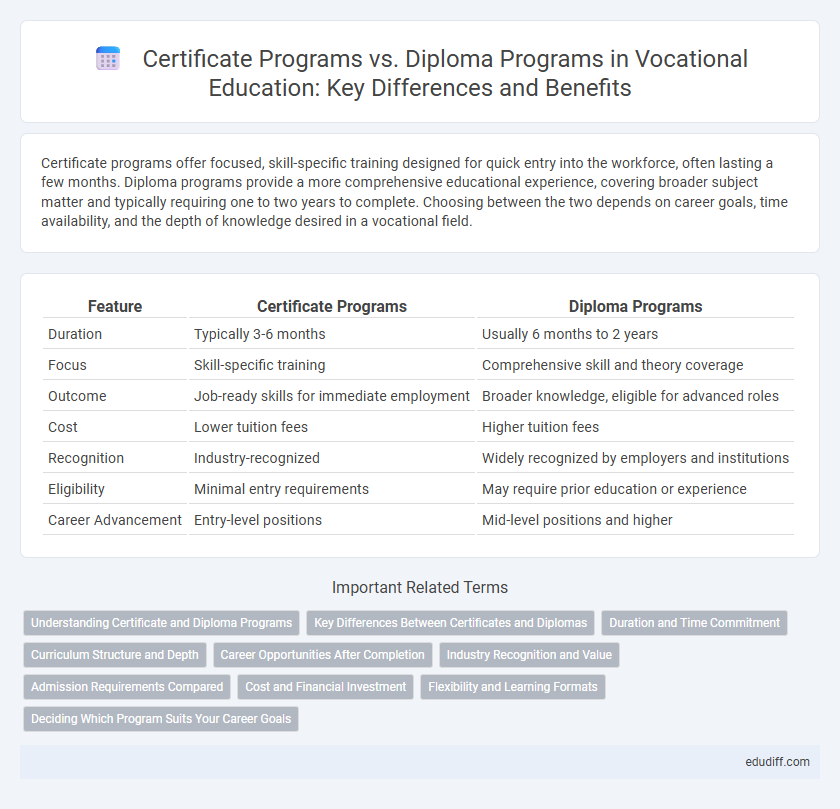Certificate programs offer focused, skill-specific training designed for quick entry into the workforce, often lasting a few months. Diploma programs provide a more comprehensive educational experience, covering broader subject matter and typically requiring one to two years to complete. Choosing between the two depends on career goals, time availability, and the depth of knowledge desired in a vocational field.
Table of Comparison
| Feature | Certificate Programs | Diploma Programs |
|---|---|---|
| Duration | Typically 3-6 months | Usually 6 months to 2 years |
| Focus | Skill-specific training | Comprehensive skill and theory coverage |
| Outcome | Job-ready skills for immediate employment | Broader knowledge, eligible for advanced roles |
| Cost | Lower tuition fees | Higher tuition fees |
| Recognition | Industry-recognized | Widely recognized by employers and institutions |
| Eligibility | Minimal entry requirements | May require prior education or experience |
| Career Advancement | Entry-level positions | Mid-level positions and higher |
Understanding Certificate and Diploma Programs
Certificate programs provide targeted, skill-specific training designed for quick entry or advancement in a particular vocation, often completed in a few months. Diploma programs offer a more comprehensive curriculum, combining theoretical knowledge and practical skills over a longer duration, typically one to two years. Both certifications enhance employability, but diploma programs generally deliver deeper expertise and broader career opportunities in vocational fields.
Key Differences Between Certificates and Diplomas
Certificate programs typically require less time to complete than diploma programs, often ranging from a few months to a year, focusing on specific job skills or industry certifications. Diploma programs usually have a broader curriculum, lasting one to two years, providing comprehensive knowledge and practical training in a vocational field. Certificates emphasize skill acquisition for immediate employment, whereas diplomas combine theoretical education with hands-on experience for career advancement.
Duration and Time Commitment
Certificate programs typically require a shorter duration, ranging from a few weeks to several months, allowing for quicker entry into the workforce. Diploma programs often demand a longer time commitment, usually spanning one to two years, offering more comprehensive training and in-depth knowledge. The time investment in diploma programs supports greater skill development compared to the faster, skill-specific focus of certificate programs.
Curriculum Structure and Depth
Certificate programs feature a concise curriculum focused on specific skills or competencies, enabling rapid entry into the workforce. Diploma programs offer a deeper and broader curriculum, covering both theoretical concepts and practical applications within the vocational field. This comprehensive structure in diploma programs provides more extensive training and better prepares students for advanced career opportunities.
Career Opportunities After Completion
Certificate programs provide targeted skill training that enables quicker entry into specific job roles such as IT support, healthcare technician, or skilled trades, often leading to immediate employment opportunities. Diploma programs offer more comprehensive education, equipping graduates with advanced knowledge and practical experience suitable for supervisory or specialized positions in fields like engineering technology, business administration, or nursing. Employers often value diploma holders for leadership roles or technical expertise, while certificate holders are sought for their specialized skills and ability to fill entry-level positions efficiently.
Industry Recognition and Value
Certificate programs offer focused training with strong industry recognition for specific skills, often leading to quicker job placement and targeted expertise. Diploma programs provide a broader scope of vocational education, enhancing comprehensive skill sets and increasing long-term career advancement opportunities. Employers frequently value diplomas for their depth, while certificates are appreciated for their practical, job-ready competencies.
Admission Requirements Compared
Certificate programs typically require a high school diploma or equivalent for admission, making them accessible to a broader range of students seeking quick entry into vocational fields. Diploma programs often have more stringent admission criteria, such as prerequisite coursework or relevant work experience, reflecting their comprehensive curriculum. Understanding these differences helps prospective students select the most suitable program based on their educational background and career goals.
Cost and Financial Investment
Certificate programs often require a lower financial investment compared to diploma programs due to shorter duration and fewer course credits. Diploma programs, being more comprehensive, typically have higher tuition fees but may offer greater long-term earning potential. Evaluating the total cost, including materials and potential lost income during study, is crucial for making an informed vocational education decision.
Flexibility and Learning Formats
Certificate programs in vocational education often offer greater flexibility with shorter durations and multiple learning formats such as online, part-time, and self-paced options, catering to working professionals. Diploma programs typically require more time commitment and structured schedules, with a focus on comprehensive, hands-on training that may be less adaptable to remote or asynchronous learning. Choosing between them depends on the learner's availability and preferred pace, with certificates providing quicker entry into the workforce and diplomas delivering deeper skill development.
Deciding Which Program Suits Your Career Goals
Certificate programs offer targeted, skill-specific training ideal for quick entry into specialized vocational fields, often requiring less time and financial investment than diploma programs. Diploma programs provide a broader, in-depth education combining theoretical knowledge and practical experience, suitable for career advancement or roles demanding comprehensive expertise. Evaluate your career goals, industry requirements, and desired time commitment to determine whether a certificate or diploma program aligns best with your professional aspirations.
Certificate programs vs Diploma programs Infographic

 edudiff.com
edudiff.com